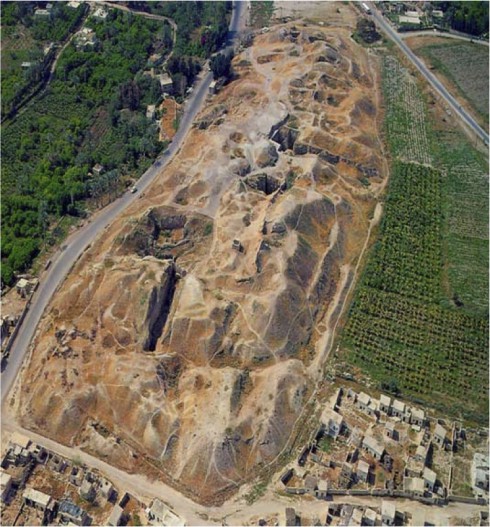History Channel’s The Bible: What really happened at Jericho?
In the Hebrew Bible (Christian Old Testament), when the children of Israel finally make it out of the wilderness after escaping Pharaoh’s army and wandering for 40 years, their first challenge in the promise land is taking down the walls of Jericho. As the story goes, Joshua (Seen above as played by actor Andrew Scarborough) takes over as leader of the Israelites after Moses’s death, heeds Yahweh’s instructions to march around Jericho’s great walls seven days in a row, and on the seventh day brings the walls down with nothing but trumpets and faith.
What really happened at Jericho? Some people of faith take the biblical story at face value, others look to biblical archaeology to confirm it. And, of course, there are always skeptics who would like nothing more than to disprove biblical accounts using modern historical and archaeological techniques. The excavation of Jericho has been a battleground for this modern-day academic war ever since biblical archaeology emerged as a serious field of study in the early twentieth century.
Jericho is special, though. First of all, no one argues about whether the city now known to be Jericho really is the biblical Jericho. Jericho is Jericho and everything about the historical and archaeological record confirms it. If the walls of Jericho came tumbling down, we know right where it tumbled.
Jericho is the oldest continuously occupied city on the planet. Let that sink in. The oldest city in the world. There’s a remnant of a wall at Jericho that’s over 10,000 years old. That’s more an 6500 years older than the wall that Joshua’s army would have toppled. Jericho was an oasis city, sometimes called the city of palm trees, and a trading post from at least neolithic times.
Jericho is also the lowest city on the planet. It sits 846 feet below sea level. That factoid doesn’t have any real relevance to the biblical story. Its just cool.
In the 1930’s, an archaeological team lead by John Garstang excavated the walls at Jericho that were thought possibly to line up with the biblical account, and what they found was amazing. The bottom of the wall was made of stones set into the hillside. On top of that was a mudbrick wall. When it was excavated, sections of the mudbrick wall were found collapsed on the ground outside the lower stone wall. And, on the archaeological layer immediately after the layer of the collapsed wall was found erosion that suggested that the city had been abandoned for some time before it was rebuilt.
What makes these two findings so exciting is that they seem to corroborate the biblical account. The walls of Jericho were said to “fall beneath themselves,” which is a really weird construction, but it describes exactly what Garstang’s team found with the mudbrick wall collapsed beneath the stone wall that it had originally sat on top of. And the evidence that the city was abandoned after the walls fell corroborates the biblical account that Joshua was said to have put a curse on the Jericho such that no one could live there for a generation after the city was conquered.
Twenty years after Garstang’s excavation, Kathleen Kenyon brought a team to Jericho. They, too, found the fallen walls and the evidence of the city’s abandonment that matched the biblical account; but, Kenyon argued that all of that evidence was 150 years too old to be evidence of the biblical Jericho. I’m getting out of my depth fast, but imho 150 years doesn’t seem like a big gap when we’re talking about . . . well . . . biblical proportions, but y’all can judge for yourselves.
So, what really happened at Jericho? Well . . .it was a very long time ago, so it is very, very tough to say, but . . . it looks like the walls fell down around the time the children of Israel might have been making their way from Egypt to Canaan (and that’s another huge can of archaeological worms), and after that the city was abandoned about the same time Joshua could have put a curse on it.
Did the History Channel’s The Bible get it right? Maybe so.










